Among the bands who originate from areas outside of Northern Europe, there are few as controversial and yet artistically rewarding as Austin, TX’s Averse Sefira. Having their genesis in the era before credulous emulators gagged the black metal community with sound-alike hardcore music dressed up as black metal, Averse Sefira create black metal art in the older style, inspired by Norse and Brazilian black metal from the late 1980s and early 1990s, which puts them at odds with most of their contemporaries who like to make the more generic, less musically-complex “black metal” that has become popular in the years since 1999. Undaunted, the warriors of Averse Sefira have forged ahead on a path of creating mystical, sublime, and unrepentantly vicious metal music which is closer to its influences than competitors.
Additional guest interview questions here, courtesy of Tyler Gebar.
What drew you to black metal and not jazz or punk or ambient or baroque, or more properly stated, what drew you to black metal more than these other forms (thus forced a decision)?
SANGUINE: I have always felt called to Metal and I have always had a sound in my head that I have pursued since I was able that became clearer to me, held meaning and expression the closer I came to Black Metal. It was a journey through the initial fallout of the Genrefication, a journey through Thrash Metal and Speed Metal, Death Metal and Grindcore until one day I was played Black Metal. Then it became clear, an epiphany if you will. I understood the Sound. As I immersed myself in the Sound I began to read and understand the meaning contained within the Sound. That meaning was what I had within me my whole life. Nothing else in music that I have explored has ever merged the Within and the Sound in such union. Classical, ambient and industrial for me are close runner-ups in achieving the union, but there are mindsets within those forms that I find alien and incomprehensible, just as devotees from those camps often never understand the Hessian completely.
 Averse Sefira is one of a half-handful of north american bands who create something other than three-chord punk disguised as black metal. What drives you to take a mental vision and project it through music, instead of creating a variant on known musical patterns? How did you collaborate on this vision, and what was the course of its evolution?
Averse Sefira is one of a half-handful of north american bands who create something other than three-chord punk disguised as black metal. What drives you to take a mental vision and project it through music, instead of creating a variant on known musical patterns? How did you collaborate on this vision, and what was the course of its evolution?
WRATH: In regards to initial architecture very little was based on anything else besides instinct. Sanguine and I were ardent followers of metal in general and accordingly we endeavored in what seemed correct and effective at the time. Very often people ask about our affinity for Voivod, which I find interesting considering they were not an influence at all. Most listeners hear an odd timing structure or a false stop in metal and they immediately reference the more technical bands when in truth our chief influence was Immolation in regards to structures. Even with that in mind I do not feel we share a sound in common. Sanguine learned to play traditional folk guitar long before he played extreme music, and both of us had an affinity for classical music as well. I think our decision to draw upon a wide palette of influences rather than aspire to be a variant of one specific band our style gave us a foundation that allowed for continuing innovation and exploration. I don’t quite understand the desire to be a band that is a blatant reiteration of another established act whose work will always remain superior. Why not just be a cover band? It involves less initial planning and more immediate gratification (such as it is). I savour the idea that we are rarely dismissed as sounding like any one band. If you read our reviews, we are compared to Immortal, Voivod, Marduk, Immolation, and everything in between. To address the “three-chord punk” aspect, this seems to be a symptom of minimalism being mistaken for an elementary approach. The two are anything but synonymous yet it opens the door for uninspired amateurism, most of which is thankfully and quickly ignored and abandoned.
How was the energy that inspired you to become formative in Averse Sefira different from other energies you had felt?
SANGUINE: Black Metal is like lightning striking you, the resultant chemical and electrical disruptions alter perceptions and break down barriers between the Terrestrial, the Celestial and the Void. Averse Sefira being an eruptive living presence is a magnification of these disruptions. It becomes a symbiotic relationship sometimes guiding, sometimes being guided.
When did you first get into music, and what are your memories of what attracted you to it? Also, when did you first hear metal and what did you like about it? What was the progress of your moving from outside to inside the genre, as first a fan and then a musician?
WRATH: My first interest in music was classical, from when I was about three years of age. Mussorgsky’s “Night on Bare Mountain” was a genius work that first sparked my appetite for “evil” music. Beethoven and Mozart were also standards, along with Alice Cooper. By about 1986, however, I was anxious to find something more—by this point I was an angry, hyperactive, hormone-addled youth who still wasn’t even old enough to drive. This was the point when Metallica, DRI, Anthrax, Celtic Frost, Slayer, Sodom, Bathory, and Iron Maiden began to match much of “the noise inside my head” (to paraphrase our ever-trenchant guitarist). Here was music that had spirit, conviction, aggression, and, oddly enough, hope. Thus I discovered a paradigm that became a soundtrack for the years ahead, years which continue forward even now. I was a mere fan until I was fifteen, and then I took the plunge and began to learn guitar. Our first band formed before any of us were truly proficient but there was much in the way of raw talent.
In time every moment is conditioned by the previous one. Here the ground or reason of being, as the law of succession, is so simple because time has only one dimension; consequently in it there cannot be any diversity or multiplicity of relations. Every moment is conditioned by the previous one; only through that predecessor can this moment be reached. It is only insofar as that other was and has elapsed. All counting depends on this nexus of the parts of time, and its words serve merelyt o mark the single stages of succession; consequently, the whole of arithmetic depends on it, a science that teaches absolutely nothing but methodical abbreviations of counting. Each number presupposes the preceding numbers as the grounds or reasons of its being; I can reach ten only by going through all the preceding numbers; and only by virtue of this insight into the ground of being, do I know where there are ten, so are there eight, six, four.
– Arthur Schopenhauer, On the Fourfold Root of the Principle of Sufficient Reason
What music besides black metal inspires you most profoundly?
SANGUINE: Primitive chants from earlier times and Classical music. At extremes, these two forms are radical expressions of the Void. Music is a sensual and encompassing experience. The most meaningful displays of it envelop the listener causing a bubble of separate reality to form. This subset of reality wires into every fibre of being and folds the dimensions of existence until the intersection of the mundane intrudes at the end.
What attracts you to a band first – is it instrumental aspects, textural aspects (vocals, tone) or structural?
WRATH: It really depends. Often it is a combination of the elements, though I am quite a seeker of unique and convincing vocal styles. This is how I got into Antaeus, Old Wainds, Funeral Mist (the vocals on their latest are unreal), and even Immortal actually. I like bands that right upon first listen come across as a sum of their parts. This is in the end how ensemble music is intended.
What do you believe is the root of artistic conception? (examples: some say it is simply recontextualizing two forms not normally superimposed upon one another, and that this is the root of all creativity; others say it is simply a sound; some argue the mechanism is understood first; all may be explaining their own phenomenon without getting close to an objective theory)
SANGUINE: For me the root of artistic conception is the expression of the DDIIVVIINNEE. For those who cannot get around such a word being used, insert “the Void.” The artist is called or taps into the Void and finds continual ways to channel and express it. This expression can come in the form of straight religious contextualization or it can be channeled through ideology; although there is much evidence to support a feedback loop between the two (ideology vectoring religion, religion vectoring ideology.)
Music is formed of sound, art of visual impulse, warfare of the physical and words of the abstract; what realization impelled you to join all four disciplines in your artistic concept?
WRATH: From the band’s inception it seemed that total committal and immersion in the art was the only option. We have always prided ourselves in our conceptual completeness. Different facets of this paradigm are expressed in different venues as the visual design and auditory aspects predominate the albums themselves, while the physical component only writhes and poisons in a live setting. This is a form of psychic alchemy; we combine the needed elements to devise something precious and otherwise unattainable.
In music, does the recognition of signal define form, or does form define signal? Could this be a matter of approach, or is it hardwired into human consciousness?
SANGUINE: The answer lies somewhere in between. Developing children across the world will exhibit “music making” or “songwriting” occurrences in an informal manner. They explore rhythm making and melody often without initiation by the parent or group or exposure to more formal musical induction. At some point, all that is naturally occurring within our primal systems, gets written over when someone sits us down and says “this is what music is.” The conditionings leafed over what exists within us takes over and for the most part we become dependant on approach.
In chaos theory we speak of dimensionality as levels of abstraction of repetition of detail; it works in a similar way to computer compression algorithms, which note repeated patterns and assign them a token which takes up less space than the original pattern. Usually the patterns being compressed or abstracted are organized around divisions into two, as for every recognizable thing it can fragment into two halves or recombine a self and an other. How do you think this applies to methods in black metal songwriting for getting closer to a dominant theme or melody without repeating it?
SANGUINE: Humans individually exist within an internal matrix of approaches, thoughts, attitudes, and emotions, all converging and swirling at different points, creating strange relationships and associations along the way. (Not to mention how the act in groups or modify their behaviour based on who they are in contact with at any given moment.) They seem to gravitate towards twos and fours. This might explain the confusing numbers of meat attracted to the binary morality of desert religions. There is something internally pleasing about these even numbers. Conventional 2/4, 4/4 time signatures dominate most song structures and are easily grasped by the Passives and is easily wielded by those seeking conveyance on as broad a band (even if selective) as possible. Perhaps it forms a silent mnemonic system that reinforces the themes?
Music writing seems to be tied inextricably to Newton, in that if something goes up, it must come down (or vice versa.) There is also a high instance of “riff A goes three times and on the fourth time put in riff B.” The only beings that have come near to writing music interwoven with Quantum Physics are Acerbus. I am amazed that people are even able to write music at all, and I have no idea how they do it. I operate with modular components that I call “sets.” A set is usually two or more riffs that compliment each other in somewhat of a logical fashion, there is a great deal of the process based on that great unquantifable: “feeling.” Being modular, these components can be dropped in anywhere in a song and form the basic themes for the composition. They can repeat any number of times with variation imposed as required, say when the song is approaching summation, set A returns, but is played backwards, lower, whathaveyou.
I also think of the songs relative to the shapes that the themes form around. Things like StiGr.39s or the distorted bones of a skinned xtain, celestials on fire, these images are evocative in translation to musical form. One thing I am experimenting with is structuring sets akin to DNA constructions: riff sets on the guitar forming one helical half combining with riff sets on the bass forming the other helical half and the drums acting as sugars linking it all together. Perhaps the construction of an automaton or golem is also an appropriate metaphor: part is bone, part is muscle, part is flesh and part is the electricity powering it. Something that the occult bands often aspire to, or should, is to try and capture in music the essence of what they are summoning/conjuring/opening, not just play Rock and say that it is the embodiment of ritual. Although again, that would explain the obsession with twos and fours… Black Metal is after all, Black Magic but music.
The first time I came to men I committed the folly of hermits, the great folly: I stood in the market place. And as I spoke to all, I spoke to none. But in the evening, tightrope walkers and corpses were my companions; and I myself was almost a corpse. But with the new morning a new truth came to me: I learned to say, “Of what concern to me are market and mob and mob noise and long mob ears?”
You higher men, learn this from me: in the market place nobody believes in higher men. And if you want to speak there, very well! But the mob blinks: “We are all equal.”
“You higher men” – thus blinks the mob – “there are no higher men, we are all equal, man is man; before God we are all equal.”
Before God! But now this god has died. And before the mob we do not want to be equal. You higher men, go away from the market place!
– F.W. Nietzsche, Thus Spoke Zarathustra
Do you think that the pre-1996 (Nordic) blackmetal bands held this view? If so, was it their primary view – a summation of their beliefs – or one of the symbols they used to communicate their beliefs?
WRATH: In the time of their greatness, I believe the seminal acts of the region followed these ideals indeed. Regardless, it was their promotion of such things that spoke to us and inspired us to make our own bid as a band. I agree that much of the message was symbolic. The traditional idea of music in general is using art to convey meaning. At their best, the “black circle” bands were very effective in marrying these elements. It is the model under which we have laboured since our inception- symbols standing for greater motives.
How does nature respond to change, in your broad and esoteric experience?
SANGUINE: Nature adapts and ultimately overcomes and destroys, albeit very slowly. Witness the grass growing up from underneath sidewalks, or the tree that has grown over the gravestone. Nature has a much longer longevity than humanity and thus can act at its leisure. Humanity is doomed to scurry around trying to kill immortality in pursuit of its own immortality.
Why are there suddenly so many black metal bands? (this question dates from 1998)
WRATH: The simplest answer seems to be that it has become a trend, though I think a more accurate answer is that more than ever people justify themselves by the attention they get from others. We live in a society full of reality TV shows and we watch complete morons blunder into pseudo-celebrity. A large problem with the current underground (and again I refer mostly to the internet scene) is that everyone claims to be a society-loathing misanthrope who has no interest in the world at large, but then an alarming majority of these people demonstrate just how much the culture they deride has gotten to them. I am constantly amazed at how often I encounter christianized mentalities and the thin rationalizations used to justify them. Getting back to the main point, nobody in metal is interested in making music for oneself anymore. It becomes a process of picking a recombinant band name, writing some recombinant songs, then imploring people to buy a copy of your brand new CD-R. As a side note, I would really be impressed to see a new Black Metal band who went to the trouble to print cassettes and include an inlay card if anything because it would prove that they cared about making an effort.
Although Mayhem’s “De Mysteriis Dom Sathanas” is arguably more musically conventional than Darkthrone’s “Transylvanian Hunger,” both possess a spirit that is difficult to quantify in the typing that allows us to divide genre and lineage in popular music. What is this essential quality and why is it that some bands have it and others do not, to varying degrees?
SANGUINE: The Void calls to some and the others simply see what the chosen do and mimic it thinking that they bear truth as well. Both albums represent the moment of death for Black Metal in triumphant explosion, an attempt to shut off Black Metal from those who would soil what it offers. The gate was never fully sealed and Black Metal and the Void continue to call and pull a select few to it. There are those that hear the call more clearly, it remains one of those “unquantifiables.”
The bottom line is that bands with severity of conviction are closer to the Void than bands that want conviction or claim to have it because someone else says they do. The “I don’t know what art is but I know what I like” argument raises its head, although in this case it becomes something along the lines of “explaining why one band channels the Void and another one does not is difficult to quantify, the surety lies in the listen, how the space between the solar plexus feels when the album begins to turn.” Once again, “feeling” is important. Feeling and conviction. To borrow from MkM, what is projected in your art must come from every fibre of you being, it has to be your essence, you have to vomit it out for all to see.
The philosopher F.W. Nietzsche posited that western society is collapsing under a wave of liberalization that began with the adoption of Christianity by the Roman empire, a wave that has continued into the secular sector. Where do you think the original black metal impetus in Norway stood in regards to this issue, and where does black metal now stand regarding it? What is your personal view of Nietzsche’s summation?
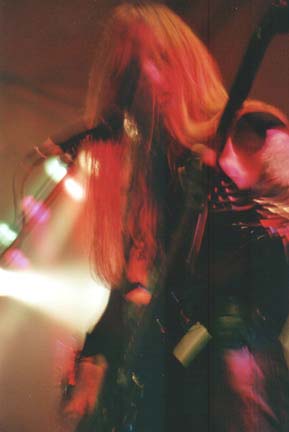 WRATH: So few people are savvy enough to recognize that christianity is a way of thinking, now more than ever. One can still be christianized and never say a prayer, set foot in a church, or even believe in Jehova. It is christian to demand that everyone be treated with the same regard and merit even when it is unwarranted. It is christian to rationalize behavior that stands in flagrant opposition with professed beliefs, the most common example in the underground being anti-christian yet having a christian significant other (most guys take what they can get without question). It is christian to compromise even when it is clear that the ends will not justify the means. Whether or not the Norse bands were truly adherent in their ideals, their music and words stood firmly against this. Too few really read Euronymous’ mission statement and understood its intent. The Norwegian movement was meant to put a stop to the open door policy of the current scene and implement a new variation that was not intended for everyone. Here again we return to the idea of elitism and why it is so necessary. As previously addressed, the traditional underground still holds these values closely for good or ill, as it is often rigorous to do so when glad-handing scensters continue to get in the way. I agree with Nietzsche’s outlook in this regard; it is particularly true in the US where christian sentiments have long subverted more sensible and functional means and values. Things here no longer run smoothly, as “being fair” or worrying about “people’s feelings” undermines common sense when it comes to getting anything accomplished. Conversely, the whole model is illusory in that so few who enforce these conventions truly believe in them. They assume the person next to them does, however, and thus they adopt a position that will ensure the least amount of judgment or sanctions. This, in its most rudimentary sense, is Christianity — servility for the promise of a nebulous reward.
WRATH: So few people are savvy enough to recognize that christianity is a way of thinking, now more than ever. One can still be christianized and never say a prayer, set foot in a church, or even believe in Jehova. It is christian to demand that everyone be treated with the same regard and merit even when it is unwarranted. It is christian to rationalize behavior that stands in flagrant opposition with professed beliefs, the most common example in the underground being anti-christian yet having a christian significant other (most guys take what they can get without question). It is christian to compromise even when it is clear that the ends will not justify the means. Whether or not the Norse bands were truly adherent in their ideals, their music and words stood firmly against this. Too few really read Euronymous’ mission statement and understood its intent. The Norwegian movement was meant to put a stop to the open door policy of the current scene and implement a new variation that was not intended for everyone. Here again we return to the idea of elitism and why it is so necessary. As previously addressed, the traditional underground still holds these values closely for good or ill, as it is often rigorous to do so when glad-handing scensters continue to get in the way. I agree with Nietzsche’s outlook in this regard; it is particularly true in the US where christian sentiments have long subverted more sensible and functional means and values. Things here no longer run smoothly, as “being fair” or worrying about “people’s feelings” undermines common sense when it comes to getting anything accomplished. Conversely, the whole model is illusory in that so few who enforce these conventions truly believe in them. They assume the person next to them does, however, and thus they adopt a position that will ensure the least amount of judgment or sanctions. This, in its most rudimentary sense, is Christianity — servility for the promise of a nebulous reward.
You were one of the first people in America to embrace black metal, at a time when most metalheads still referred to black metal as “faggot music.” What vision did you grasp that others could not see?
WRATH: More correctly, I like to think I was part of a handful of people in the US to first tout Black Metal in a public forum, mine being a radio show. I did indeed hear many “faggot music” comments (and still do, interestingly enough). As we have since established in this discourse, what enthralled me was a combination of the projected ethos, the aesthetic, and the overall atmosphere that permeated the classic recordings. I saw it as a new renaissance, a step forward, and our best hope for revitalizing a stagnant underground (which, for what it’s worth, happened to a point) . Then again, I always preferred Deicide and Morbid Angel to Suffocation or Cannibal Corpse so it is fair to say that conviction and innovation always got my attention.
I know you’re aware of occult, philosophical and musical leanings of many cultures. In your cross-cultural studies, what common threads have you found that are most applicable to the formation of human ideals?
SANGUINE: There are universal occurrences of a pantheon of gods tied to the cycles of Nature and the machinations of the Universe. There are many universal occurrences of guidelines for living, set up along the lines of balancing “virtues” and “taboos;” these idealy would ensure the survival of the society if adhered to. Societies themselves almost universally had classes for priests, classes for warriors, classes for merchants and artisans, farmers and so on. Everyone had a place and was essential to maintaining continuance. If you were not part of the society, you were the sacrifice that kept the sun rising and the next cycle beginning. These days, society is not going to collapse if you eat pork, or foods that are specially prepared. These days, there is not always a place for people. These days the divisions between tribes are being purposely blurred so that everyone thinks that everyone is the same, everyone can be anything they want. These days everyone seems content to be useless.
What do you think is the major difference between first-wave Norwegian black metal and the current crop of worldwide “BM”?
WRATH: When the Norwegian scene was unearthed they were not a part of a worldwide movement or an internet community. It was a question of standing on merit, talent, and vision. Very few of the bands forming now have this spirit, but then again they no longer need it. Black Metal, particularly in the states, has become a very tolerant and coddling entity. Ten years ago, legitimacy was not about how long one had been visiting a metal message board. At this point it is simpler for someone to simply announce that he has a band and wait for the accolades to roll in, rather than working towards something that stands as an accomplishment unto itself. The Emperor wears no clothes, and has not for some time now. Many would be surprised at my involvement with other projects, bands, and entities in the underground. My name is always present but there is no need to call additional attention to myself. I am proud of what I contribute and this is more than enough, and if there are praises to receive then I want to know I have rightly earned them rather than assume I deserved them before the fact.
The one most relevant [cultural factor] here is language. In general, scientific discourse adopts as its ideal univocality — one word, one meaning. Closely related to this goal is the belief that a language exists, or can be forged, that is purely instrumental. Clearly and unambiguously, it will communicate to the world what the speaker or writer intends to say. Roland Barthes (Rustle) has ironically called this the belief that science can own a slave language, docile and obedient to its demands. Anyone who has seriously studied how language works is aware, however, that it shapes even as it articulates thought. There is now an impressive body of work exploring how metaphors, narrative patterns, rhetorical structures, syntax, and semantic fields affect scientific discourse and thought…language is not a passive instrument but an active engagement with a vital medium that has its own currents, resistances, subversions, enablings, pathways, blockages. As soon as discovery is communicated through language, it is also constituted by language.
– N. Katherine Hayles, Complex Dynamics in Literature and Science p. 5 (1991)
Backing up a bit, in the mid-1980s Bathory and Celtic Frost stunned the world with a form of metal that was both the simplest yet created, in terms of its basic and grinding power chord riffs, and most complex, in that it staged itself like an opera, unifying a visual presentation with a concept with a musical form. This is similar to the use of music in ancient Greece, where it was believed that music by itself, without an accompanying storyline and theatrical presentation, was only partially complete. What do you think brought this view back into the intellectual currency of the West?
WRATH: It seems that those individuals grew up with a healthy fascination for their origins and heritage and quickly realized that this existence was no longer within reach as it had been long-erased industry and judeo-christian mores. What better way to resurrect mythos and wonder than by projecting it through infectious yet markedly aggressive music? For our brand of art to carry any real value it must convey meaning. In our case, the personas and music we have devised are much larger than ourselves; Averse Sefira is an entity in its own right. Immersion is what makes the music live, what makes a spindly guy in a bullet belt into a fire-breathing demon called Quorthon or a tow-headed nice guy longhair into a guitar-shredding grunt machine called Tom G. Warrior. Art is meaning, anything else is just entertainment. The earliest purveyors of this genre understood this and they insisted on creating something that transcended the workaday existence and the conventions of the world they were forced into despite their desires for more and better ways of being. This is why Averse Sefira will always appear in paint and spikes, we will always strive for involved design and presentation, we will always be all-inclusive in our presentation. Music is the foundation but in Black Metal aesthetic will always be important, no matter how minimalist it may be. Those who claim to play Black Metal but still don’t understand this paradigm should form AC/DC tribute bands and play onstage in street clothes.
I understand that unlike many black metallers, you embrace both higher education and a personal sense of honor. How does this jive with the post-1996 attitude of many fans and third-string musicians that black metal should be about “total darkness and hate, and total suicidal agony”?
WRATH: Black Metal should be about total darkness and hate, etc, etc, but perhaps not in such absolute terms. It is fine to tout such ideas assuming one understands why it matters. The problem is that most of the individuals who are quick to assert these concepts do so in lieu of anything productive or artistic. Any coward and/or moron can regurgitate “widely accepted” platitudes as an excuse to not bring anything useful to the table. Fatalism is easy because it negates accountability, and in the interim ideals like honor, fortitude, imagination, conviction, and solidarity fall by the wayside. The result is that those who speak loud and offer little have begun to overrun the movement. They have plenty of empty rhetoric, and somehow this saves them from being singled out and isolated from the beginning. It is a symptom of the 21st century that the lowest common denominator defines the trajectory of things, and it seems that Black Metal is not immune. For our part, the aforementioned “strength and honor” aspects of this music are what make it worthwhile. Those we know and respect in this movement also believe and practice within this paradigm, and accordingly they are the ones we call allies. All others should be honest with themselves and return to listening to hardcore.
What was the best part of college?
SANGUINE: I think the best part of college is the appreciation one gains ex post facto for how much was truly useless and how they would do things differently. It is kind of bittersweet, the experience. I enjoyed it but in hindsight it was not unlike a rodeo with textbooks. There is a great destruction involved on many levels.
It seems to me that death metal started with grand ambitions (Altars Of Madness, Legion) and then lapsed into the same mindless three-chord bashing that has always characterized bad metal bands; black metal was a breath of fresh air, but now so many of these bands have adopted the cloak of “Transilvanian Hunger” and are doing the same thing. What engenders this cycle? Should it be “stopped”?
WRATH: It seems so many people have looked at a band like Darkthrone and believed that the key to the music was to keep it one-dimensional. They never realized that in minimalism it is often implication that completes intent. Why is “Transylvanian Hunger” brilliant while some other three-chord album is not? This is when the esoteric takes hold and makes what would have otherwise been a repetitive and poorly produced album into a seminal work. However, when other bands ape this approach the results are transparent and poorly produced albums, period. You will not encounter many individuals who are willing to invest the time in finding their own voices and sharpening their crafts. We live in a twenty-four hour society where everything must be fast-tracked and brought to market while the commodities are hot, hot, hot! Thus we witness and endless parade of idiots who think that they need to commit their Black Metal band to CD-R tomorrow, and Darkthrone isn’t hard to mimic, so why not do that? Our drummer actually summed it up best when he observed that while most everything on the first Deicide album is easy to play, he never could have thought up any of it. It’s no surprise that Emperor turned around and alienated all the aspiring imitators with “Anthems to the Welkin at Dusk”. They wanted to be sure to shut the door on that kind of thing. So, for a short answer yes it should be stopped. I also think Darkthrone should stop grandstanding and find something else to do.
What do you think is the lineage of black metal, and what are its major influences outside of the genre (or even outside music)?
SANGUINE: Do you remember the time, before the Great Generefication, when it was ALL METAL? At some point, someone said, “THAT’s Speed Metal, THAT’s Death Metal, THAT’s Thrash Metal, this new stuff’s called Grindcore,” and in the murky depths of fanzinedom, some one said, “Sodom, Venom, Bathory, Sarcofago, Pentagram, Beherit, Blasphemy, Mystifier, Master’s Hammer, These guys are BLACK METAL! (Well, these are the guys that were doing Black Metal originally; Immortal, Darkthrone, Bvrzvm, Emporer, Mayhem, THESE guys are {True!} BLACK METAL!”
“Why is this Black Metal? What makes it so?” the Incredulous asked.
“Because it’s SATANIC!” the Generifier said.
“So that makes Decide, Morbid Angel, Incantation, ad nauseum, Black Metal bands.”
“Oh no! They are Death Metal bands! They have a more chromatic chord base, double bass blasts and low, growling vocals.”
“Ah! So what make these new bands (that are Satanic/coming out of Scandinavia) Black Metal?”
“The guitars are more melodic, they blast with a single kick, and the vocals are pitched higher. And they have paint and spikes and burn churches some of them. The Death Metal guys wear jeans and sneakers, ‘jogging suits’ and look like everybody at shows”
“I see, so it is an aesthetics and form delineation that makes something Black Metal and not Death Metal.”
“No, it is also their ideology, these guys are warring against Christianity, they are searching for their lost Viking roots, blah, blah, blah.”
“So how can you play Black Metal then Don Diego?”
“Because I and my band are hailing Satan and writing songs about Satan’s triumph over the Earth and killing christians.”
And so on. I agree with that theory: that what everyone initially agreed quantified and qualified a band as Black Metal was a Satanic theme, concept or aesthetic. When the whole Norway/Sweden/Finland “scenes” erupted, that same Satanic element was very strong. At some point this split and fractured; varicose offshoots running amok touting National Socialism, Medieval Satanism, Paganism, Vampirism, Genocide, Nihilism, Forests, Misty Fog, etc; one could graph the ebbs and flows. Some of these arteries have hardened and with every form, conventions solidify and one can now safely describe bands by “they sound like.”
And at this point it all really matters not at all. The lineage of Black Metal is well known as legend with even the wettest behind the ears able quote from “Lords of Chaos:”
“Once upon a time, there was Euronymous, Dead and Count Grishnack. Dead begat the germ that is Black Metal. Euronymous became jealous and killed Dead for this germ [er, ah he committed suicide.] Count Grishnack killed Euronymous for, well perhaps just to get the next phase going.”
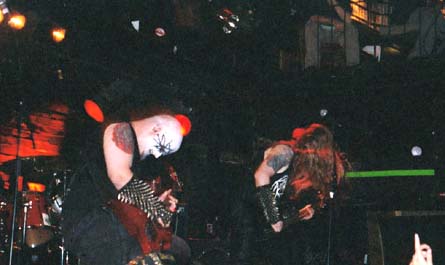
IF that is so and Grishnack burned the chruches to wake up Norwegians, perhaps Euronymous’ death was to awaken Hessians, get them thinking about what this is really about.
The great majority of them, the ones that “made the Metal community at large aware of Black Metal,” I still want to feel that they believed in something, that they adhered to an ideology. I want to think that they weren’t just doing it as a joke and now they can go back to their Nine Inch Nails. Many have abandoned what they initially raised high banners in the name of, and many still raise high banners so long as they look right and play music that sounds ‘just like _____!’ It seems like so many have lost their faith, for Metal has its religious qualities, that one can wonder sometimes if there has ever been any meaning to this music, this form. The fact that there are some adherents, some faithful still out there, that to me will point to a common truth wherefrom this movement sprang from. The lineage of Black Metal is now legend, and I feel that it is served better in this manner. Where it is going, what is done with it to keep it vital, thriving and mutating, is of the utmost importance.
Movements pushing ideologies have crept in through Metal, the fanbase appearing as an untapped resource that many would like to exploit, be it financial, material, physical, political, religious. Movements within Metal have arisen and now seek to creep outward, to effect and depose the JCI society that seeks to ruin and despoil what is being accomplished. There is a great war of hearts and minds being waged by those who want to keep Metal regarded as “frivolous.”
There are important leaps in meta-philosophy and meta-culture being made by enclaves of Hessian think tanks. I say it “meta-” because unfortunately such efforts will never be recognized as “legitimate” by the current JCI society. Hessians, as a meta-culture, truly global and post-moral, operate in a closed system making plans for what should promise to be a better future; unfortunately, this knowledge will always be suppressed and disregarded, “the rants and ravings of fringe elements and radicals.” Such accusations are made still, mostly by an unwashed mass with the mean age of 20. The potential within these nay-sayers is still there but still suffer from the conditioned thought of the society around us. Ten plus years ago, I think that Hessians were not as accomplished thinkers as they are today. Ten plus years ago, the message put forth was “Party! Let’s get out our aggression {until we cave to society’s demands!} Oh shit, there might be nuclear war! That’s bad!” Today, the message has changed: “Society is broken and must be set on fire. From the ashes we can rebuild and move forward in a more productive manner, but doing so requires the fetters and fears that bind us be cast aside so that we can act beyond the constraints of morality, act unhindered.”
American society has never fully accepted evolution as a theory, where Europe seems more scientific in outlook. Does this affect cultural and personal views of metal music, art and how to make it?
WRATH: American society has never fully evolved either, so how would we begin to grasp such theories? Of course our remedial culture stunts creation of art just as European culture propagates it. If you look around you, the American underground has all but succeeded in turning US Black Metal right back into Death Metal. What does that tell you? This is why the European bands and their mentality appeal to us. We have further cultivated a sense of this in our travels and travails in that region, and sometimes I cannot believe we are still on the same planet. Some have asserted that we wish we were a European band and all I can say is that they have been paying attention.
360.00 Universe itself is simultaneously unthinkable. You cannot think about the Universe sum-totally except as a scenario. Therefore, for further examination and comprehension, you need a thinkable set, or first subdivision of Universe, into our systems.
362.00 Our original definition of Universe is a finite but nonsimultaneously occurring aggregate of all human experiences, which is, therefore, a nonceptual total Universe. It is logical to proceed from this definition to discover the patterning characteristics of the first conceptual division of Universe into a structural system. After we subdivide Universe into systems, we will make further reductions into basic even experiences and to quantum units. We will then come to the realization that all structuring can be identified in terms of tetrahedra and of topology.
– Buckminster Fuller, Synergetics
Do you watch television and/or movies?
SANGUINE: No TV. I would like to still watch movies, but I feel great pressure from within to make better use of my time and life’s energy, so I generally abstain.
People have accused you of being an elitist. How do you answer that? Also, what is your feeling on the similarities and differences between “musical elitism,” or really elitist meritocracy based on personal artistic output, and an enlightened sense of anti-social Darwinism?
WRATH: Those who feel I am an elitist are usually standards-bereft bottom feeders who are beneath me. Is this not for what Black Metal was intended? The modern iteration of this genre was a reaction to Death Metal’s increasing lack of ethos and liberalized sensibilities. Decrying elitism is yet another facet of our tailspin into the lowest common denominator. Musically and socially, elitism is more necessary than ever yet there are so few genuine adherents to this mindset. Most people would prefer to be hypocrites or apologists rather than invest in the rigors of aspiring to something better. It is not a question of perfection, it is a question of consistency. It is no coincidence that as a band our appeal is selective, as this is what elitism requires. Pleasing everyone is for the MP3 bands of the world.
What technological development of the last 30 years do you fear the most?
SANGUINE: Microwaves, anything that disrupts the body’s electrical systems.
How does religion and/or popular social views affect the composition of music?
WRATH: It seems to drive quite a few bands to trivial output. Again, as mentioned previously the biggest problem with the metal underground right now is the social aspect. Bands want attention and validation more than they want to set artistic goals these days. This is definitely putting the cart before the horse, but that is to be expected in the post-MTV generation. Simply having a band is never enough. When we began Averse Sefira, we never had the slightest inkling that it would become something about which anyone beside ourselves would care. Witness the fact that we ultimately released our first album on our own after rejecting a few thin label offers. For us it was never about acceptance or popularity, and even now we are often surprised and even skeptical of the response we get from listeners. Purely artistic goals are increasingly uncommon in metal, and in part I would agree that society is to blame. In terms of religion’s effect, please refer to my earlier comments on chrisitianized people in metal.
Do you think digital computers provide any models, fragmentary or mimetic, of human consciousness?
SANGUINE: Yes, in that they both have to be programmed and once programmed, there is a great chance for corruption, viruses and crashing.
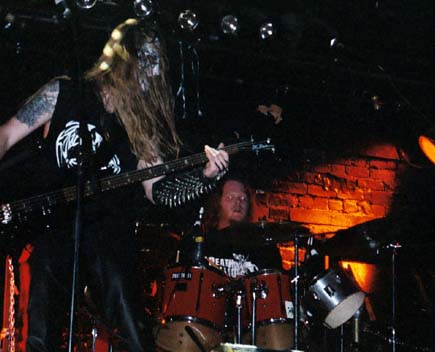 Some have said the Christian vision of the “soul” is nothing more than the ego yearning to assert itself despite mortality. Do you think this is true? The ego is also paradoxical, in that it is both useful and, if too much of it occurs, destructive. Is there a general principle that can be derived from this?
Some have said the Christian vision of the “soul” is nothing more than the ego yearning to assert itself despite mortality. Do you think this is true? The ego is also paradoxical, in that it is both useful and, if too much of it occurs, destructive. Is there a general principle that can be derived from this?
WRATH: I think the soul is the navigator of the physical body, but as such when the physical meets the end the navigator is extinguished as well. Were this not true then we would not grieve so when those close to us die. What difference does it make if there is an afterlife or not — we are here now. All I know is that dualists forever debunk their own assertions in their failure to deal with death in ways that do not involve fear or grief. What is there to mourn if another life directly awaits on the other side?
The soul seems to be the sum of its parts, both tangible and intangible. One part cannot exist without the other. In terms of ego, you are correct that it is both an asset and a liability. I myself have ego to spare and I find it can lead to garnering great friends as well as bitter (if completely ineffective) enemies. In the more traditional sense, too much responding to drives, desires, and needs leads to both excess and even chaos. Chaos is sometimes good and necessary, but it is well advised to be aware of your own role in its midst.
As humanity poisons Earth, it may be necessary to engage in space travel where individuals will not only be cut off from the world for journeys taking most of their natural lives, but also will be cut off from any kind of parent culture as it disintegrates while they are in space. If these space travelers wrote philosophy or music, what ideas do you think would be emphasized?
SANGUINE: Unfortunately I think they would try to keep the ideal of “goD” going as long as they could. There would also be a biological push to replicate in as many and different combinations as possible so as to ensure genetic existence. To this, all conventions of matriarchy/patriarchy would have to dissolve and notions of conventional pair bonds would have to be cast aside. Everyone would have to breed with everyone else, the idea being that “the best and brightest” have been evaluated and chosen as such “the species” (or amalgamation thereof) would survive and promulgate. Given the limited supplies and space restrictions of a space going vessel, birth cycles would have to be regulated. A new culture would rise and the aspects of it, philosophy, music, etc, would have to revolve on the axis of breeding, “what are we going to do when we land?” and Christmas…
In many ways, Americans are shown by media archetypes how to grow up very quickly on the outside, leaving the structure behind emotions and logic relatively unformed. What do you think are the benefits of this form of extended youth?
SANGUINE: On one hand, delayed development benefits those that will have a greater purpose the close Geburah comes. These will be prepared to pilot the new society towards the halls of tomorrow. Extended youth on the other hand hinders those that embrace the nailed son of monkeys and pigs, for these, there is constant forward pressure into the meatgrinder of JCI society. Things of status are sought and warred over, devotion becomes measured by the material. They squander their youth early in a mad rush for adulthood and when they arrive, they have transfusions of bitterness, guilt, and hate to replace all that once was within them.
Nietzsche also spoke of “eternal return,” or the concept that our lives are lived once and a representation of eternity in the human consciousness would be a perpetual cycling of the memories of that life — this vision was offered in direct contrast to the christian vision of a single life followed by an eternal life of stasis in pleasure. In this writing, the battlelines were drawn between those who believed in another world – the dualists – and those who believed the present was all that existed and thus real-world achievements were more important than symbolic or religious assertions. Do you think this is accurate and on which side of the equation do you fall?
SANGUINE: If we reoccur eternally along the same path, with everything up to the revelation being eternally fixed and immutable, would it matter? The transition between cessation and genesis would necessarily cause the memories and experiences of the same former existence to be wiped away; there would be no acknowledgement of what is already known. The burden of such retention would begin to wear upon the bearer to the point that and endless suicide loop could very well mutate. Nature after all abhors not only vacuums, but closed systems. Until it breaks however, it would be fantastic.
WRATH: I would agree this is fairly accurate, discounting the idiots who say, “well I dunno” when confronted with questions about the meaning of life. I fall very strictly into the latter category, in that I believe the only guarantee we have in the course of existence is that we are living on this plane and we have a certain limited amount of time to make the most of it. This is a shared idea within the band, which is why we do things like abandon gainful employment in the name of touring, etc. I believe one simply cannot put a price on life experience.
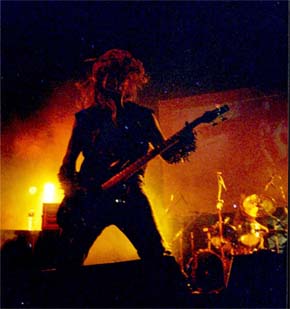 Do you believe in the soul?
Do you believe in the soul?
SANGUINE: After a fashion, yes. I also believe in a spirit. I think these are component parts that make humanity somewhat different from other meat. Not better, but different.
Do any higher powers exist for you?
SANGUINE: Sometimes.
There are a great many matrices and states (altered or not, conscious and unconscious) that interconnect and overlap within and without a single human at any given time. At least there are for myself. Think about how often there are three songs playing in your head while you are driving almost from rote while mentally composing an essay or letter and carrying out a conversation, all on three hours of sleep. And you still marvel at sunlight drifting through clouds. There are multiple attitudes and thoughts you have towards a group of people or a single person, friend, enemy that you have when alone. These same orbits change when interacting with that person or when you are part of your own circle. They change again when you are forced into a job and a group of people that you have nothing in common with, save civility. All this to say that there are many levels of existence, the stark material cannot be the sole.
Egalitarianism and the soul are argued by some to be necessarily codependent concepts. can you explain your views on this subject?
SANGUINE: They want all things to be equal because they want everyone’s soul to be equal, important, and matter just as much as everyone else’s. The glorious truth is that not everyone makes an equal contribution, not even those who contribute a great deal, thinking that it is quality not quantity that matters, makes them a “better” person (but only to themselves, not in the sense that they are above anyone else!). The glorious truth is that not everyone matters. The glorious truth is that 5.9 billion souls are in need of immediate harvesting and those that are left will just have to figure out how it really works.
Many have for years stereotyped metalheads to me as angry, socially abusive people obsessed with negativity and rejection, usually from reasons of low self-esteem. Another variant of this behavior is that at a party, often the loudest people are the ones with the greatest need to make their presence known. I never believed this, although I noted many people who fit this description in the metal community; however, it seemed that post-1998 this percentage exploded and most of the smart people attracted by the promise of early modern black metal (1990-1996 Scandinavia) left the genre. Is this consistent with your experience? Why do you think this trend has come about?
WRATH: I wouldn’t say the smart people are all gone, they just have better things to do than argue about Sabbat with tech-school dropouts. I think one of the most damaging aspects to the genre was the way nearly all of the Norwegian front-runner bands managed about two worthwhile albums apiece and then launched into tangential bids for commercial success. Credibility was compromised, populism took hold, and kids who wanted something more radical than mallcore crept in. At this point it seems that we have too many people who were supposed to have been listening to Iron Maiden and playing Dungeons & Dragons coming in and acting as self-appointed authorities on all things black and evil. Most of them are wounded, stupid, aimless, talentless, or all of the aforementioned. Refer to my comments about not qualifying oneself before demanding patronage. This doesn’t apply to the European scene as much — their dead weight is harder to readily identify and a few among them have proven to be ingenious frauds. At least they try harder.
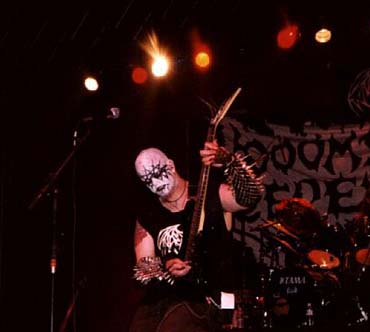
What Texas bands do you enjoy?
SANGUINE: Acerbus and Absu. I also enjoy former greats such as deadhorse, Rigor Mortis and Pain Teens.
Our entire historical cycle comes many years after the fragmentation of the Greco-Roman empires, but if looked at in the whole, is a progression from simple melodic lines to a sense of absolute melodic freedom; if looked at from a meta-level, it is a progression from music being symbolic of an artistic process (e.g. applied in theatre as did the Greeks) to music being symbolic of itself, at which point it communicates nothing other than what is inherent in the notes themselves. Clearly to the Greeks this would have been degenerate; the question is whether the cycle comes around to what they discovered, in which musical devices are fully known and thus the only question is how to use music as a language – which of course, requires the language _describe something_. How do you think black metal fits into this?
WRATH: It seems that much of Black Metal, indeed in the way our band crafts songs, falls into the “dissonant, smaller pieces” category. In our work, the music is definitely treated as language, though I don’t agree that all bands have a handle on this aspect of the creative process and as such we have the degenerate examples of music that is symbolic of itself. It is no coincidence that we are forever asked, “What are your lyrics about? What is the concept about?” Our goal from day one was to commute ideas through musical structures otherwise what is the point? It is not unlike the difference between talking simply to do so or talking to communicate an idea. In Black Metal the wheat is easily separated from the chaff when a band is asked in an interview to discuss their message or intent. When the answer is the standard vulgar, all-capitals diatribe against christians, society, and any band with musical value then it is clear they are not about communicating actual ideas. This is serviceable for the purposes of novelty but it will not endure, nor will it garner the type of audience worth having. I think that at its best Black Metal communicates volumes of ideas, both universal and esoteric. Consider a song like “I am the Black Wizards” and its portent; this genre offers so much opportunity for transcendent ideas and ways to express them. The palette is incredibly broad and thus ideas of alienation, misanthropy, aspiration, passion, hatred, and wonder have been aired in ways unheard of in any other musical form. The important commonality is that all the best bands set out to communicate. Think about Emperor at the end of their career- what is it that they were trying to say then, other than they wanted to cease? The Greeks definitely knew what made art significant, to be sure.
If you could fight in any war, which would it be?
SANGUINE: I am torn between WWII and Vietnam. WWII was the last great war of the old ways; the heroic ideal as I identify it today was at its peak in so far as its iteration in that age. Vietnam is the first modern war and there is still much to be learned from it. Vietnam was the war that reminded Amerika of its guerilla warfare heritage still struggling to implement lessons learned in a recent past. WWII hearkens back to better times; Vietnam can teach lessons for our current paths.
Do you believe the universe created itself, emerged from a precursor state or was synthesized by a mechanism not describable in causal states of any kind thus far known?
SANGUINE: The recent detection of polarized echoes from the Big Bang seem to indicate that the Universe was born out of an indescribable mechanism, however there had to be some sort of existence of the raw potentials for such genesis. Endless feedback and circular scenarios.
What do you think is next for black metal: will it continue on essentially a linear developmental curve, or will it mutate into another genre? Will it ever reclaim its original intensity?
WRATH: That is a truly difficult question. The issue at hand is that there are two undergrounds: the traditional and genuine, and then the loud and posturing popularity contest that has risen to the surface like a bloated corpse. With this disparity in mind, it becomes hard to predict much of anything. Many bands are still holding the banner of the “old ways” high, and these are the bands with whom we align ourselves. Perhaps the illegitimate side will mutate, considering their brand of “black metal” is effectively old death metal and NWOBHM. The simplest way to describe it all is that the underground went back underground, and as such the intensity and passion was never truly lost. It has become more incumbent upon us all to keep the best our genre has to offer away from those who would malign and misappropriate it. These days I hesitate to discuss bands I enjoy in public forums as I fear it further spoon-feeds the novelty-seekers and arrivists.
For some, there are two kinds of art: one that describes or laments the current world, and another that brings forth a heroic spirit of change and/or rearrangement of mental processing through which the user then sees the world. Which of these is your preferred mode of artistic cognition?
SANGUINE: That which inspires transformations within and without. There is too much “art” that is just “there;” purposeless, useless but for the mercy of the meat that embraces it as “valuable.” To them, everything is equal.
Black metal has become redundant both ideologically and musically in recent years. Many would say that ideology, or perhaps the pretentious portrayal of a facade, has become more important to black metal musicians than injecting the true spirit of their unique perceptions into the raw force of music that they craft. Do you believe that this is true, and if so, to what do you attribute this decline?
WRATH: I would say this is as true as not. That is a slippery idea because it is subjective. Some bands present with concepts and music that demonstrate their lack of understanding, but at the same time they believe in it so would that count as a facade? My standing complaint is that only a small portion of bands bother to fully understand the nature of the art before forming their own bands and then propagating their mistaken interpretations. Sanguine and I were metalheads since the mid-80s and still we took our time in forming Averse Sefira because we wanted to do it right and not have an early career that was riddled with missteps. So in regards to this decline you mention it seems that the urgency of getting on the bandwagon is probably the biggest culprit.
The song structure of your music often bears similarities to the thematic writing of classical composers. Do you enjoy classical and romanticist composers, and how do they influence your work?
We enjoy it very much. Classical music was some of the first music to which I ever actively listened, starting at about age three. Sanguine is actually an even more avid fan than I, and he attends concerts regularly (which is something I need to get back to doing myself). He also listens to a lot of film soundtracks that have orchestral arrangements. Beethoven, Wagner, Mussorgsky, Prokofiev, and Mozart are all part of our musical landscape. Much of our arrangements, particularly on the last two albums, have been written with this paradigm in mind. It seems that black metal draws upon classical much more than other forms of extreme music.
I have read in past interviews that your albums “Homecoming’s March” and “Battle’s Clarion” form a complex narration of mysticism inspired by material found in Kabbalic mythology. The albums seemed to interpret the exile of certain sefira from the realm of god, who rebelled against their creator in the ultimate act of attaining freedom (correct me if I am dead wrong on this). To be honest, I have yet to discover how “Tetragrammatical Astygmata “and “Advent Parallax” fit into this plot line. Do these albums continue the conceptual leanings of your early releases?
Interesting question, I’ve been wondering the same thing myself. For one interpretation of the first two albums, I don’t think you’re wrong. Initially, all the albums were to fall under an umbrella of themes, with multiple trails of thought weaving together (linked together songs, placement of songs, embedded shallow numerology) to allow every song to have a place in a “correct order.” As evolution has occurred, progression taken place and gateways passed through, old forms have been shed in favor of a refinement of original purpose.
Conceptually, the key themes from the first two albums are the same as the key themes of the latter two albums, just dressed differently. Creation springs from destruction in an endless cycle until the cycle is broken. The celestial becomes the terrestrial as the flesh melts away and becomes spirit. The “I” at whatever level of consciousness(es), must come to grips with the process of change and the consequences of transformation. Shaatialn.
Whereas “Tetragrammatical Astygmata” found beauty in the roar of the infernal; the dissonance seems to have been restrained upon “Advent Parallax”. However, the anthemic melodies paint broader strokes, and are much more pronounced. Was this a calculated progression, or did the change occur naturally?
The vibrations of “Tetragrammatical Astygmata” reflected the flesh while describing the spirit. “Advent Parallax” vibrates the spirit while reflecting the flesh. There was hidden purpose in the intertwining of these frequencies, a purpose not yet revealed. There was a natural calculation that produced progression. It’s all part of chasing the dragon. The dragon is either caught and the last seal of understanding is broken and there is nothing left to accomplish or the pursuer is broken in the pursuit, devoured by the dragon and there is nothing left to accomplish. In the end, there is only the void. Only death is real. Thyapihlon.
What particular forces introduced you to the metal genre, and what were your initial reactions to it?
I was driven by “the noise inside my head” as Sanguine has always called it. I started at post-infancy with a fixation on bombastic classical music and Alice Cooper (more for his aesthetic than anything else) and then moved on to progressively louder and scarier things. Actually, I was still very young when Motley Crue broke out with “Shout at the Devil”, and I flatly rejected it because they looked like ugly girls and it struck me as gross and stupid. Thrash and proto-death/black reached me more immediately, however, and so I quickly became an adherent to all the well-known acts like Sodom, Celtic Frost, Metallica, Slayer, Anthrax, Voivod, etc. Right about this time I realized that this music was all I really ever wanted out of life. It was not just music but a way of being. I have a lot more to show for myself than just metal, but without it my reality would be a much blander and unexciting one.
Several people seem to recognize that the filth of the human race is clogging the pores of our land, and in effect devouring the environment at an agonizing pace. How do you feel about environmental concerns, and those who advocate major change in order to stabilize the planet? Also, do you feel a deeper bond with nature than most around you?
Eliminating two-thirds of humankind from the globe would be a good start. I myself refuse to breed and I wish more people felt the same. I have an appreciation for nature, yes, though I would be lying if I said I had a deeper bond. I spend most of my time in cities as this is where most of my necessary doings occur.
A splurge question, if I may. Reality is said to be the perception of your surroundings through your senses. However, the same stimulus can be interpreted in a vastly different manner by the individual than that of their peers. Do you believe that what the senses experience is subjective, that these experiences define reality, and if so, how do you believe one must measure the validity of their actions?
I suppose due to our exploration of metaphysics Averse Sefira invites many existential questions. I believe in the idea of a consensus reality where everyone can agree on certain perceptions that are known to be true- the sky is blue, the sun is hot, we need air to breathe, etc. Of course past this consensus there are many vastly different realities in which people live, some to their own delusion and detriment. But I would not agree that reality is wholly subjective any more than its governing factors of time and space.
In conclusion, are there any particular words of wisdom or notification that you would like to impart upon your fans who frequent this website?<
I’ll take the opportunity to announce that “Advent Parallax” will soon be out on LP through The Ajna Offensive. Support this excellent label. Also, www.josasmith.com is where one should go to see the works of Jos A. Smith, as his work adorns the cover of “Advent Parallax”.
The Egyptian Culture is an embodiment of care – which is the spiritual counterpoise of distance – care for the future expressed in the choice of granite or basalt as the craftsman’s materials, in the chiselled archives, in the elaborate administrative system, in the net of irrigation works.
Contrast with this the fact, symbolically of the highest importance and unparalleled in art-history, that the Hellenes, thought they had before their eyes the works of the Mycenaen Age and their land was only too rich in stone, deliberately reverted to wood; hence the absence of architectural remains of the period 1200-600. The Egyptian plant-column was from the outset of stone, whereas the Doric column was wooden, a clear indication of the intense antipathy of the Classical soul towards duration.
– Oswald Spengler, The Decline of the West
All photos copyright © Averse Sefira and Noektrymn.de.
No CommentsTags: averse sefira, birth a.d., imprecation, sanguine a. nocturne, trenchant, wrath satariel diabolus

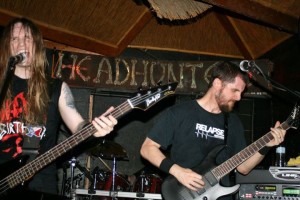
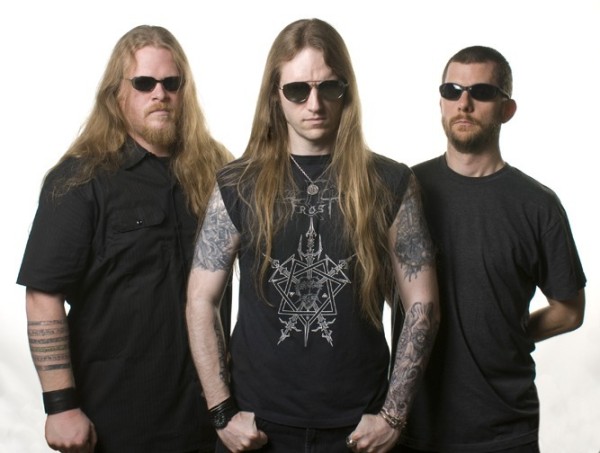

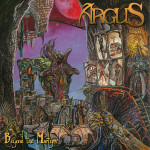
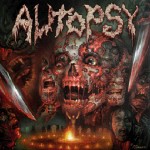
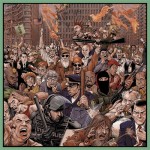
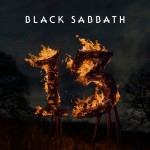
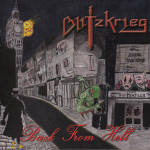
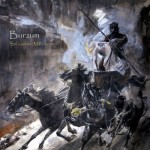
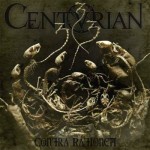
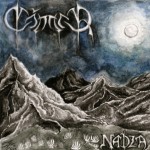
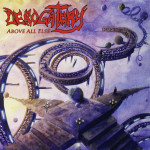
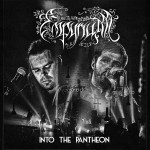
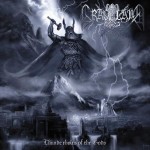
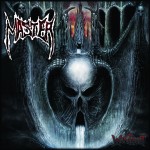
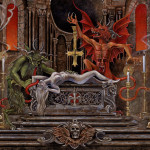

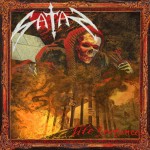
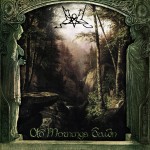
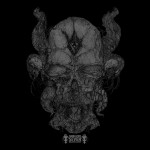
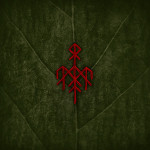
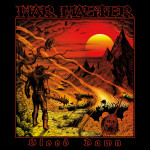
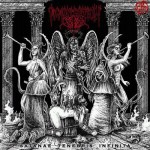
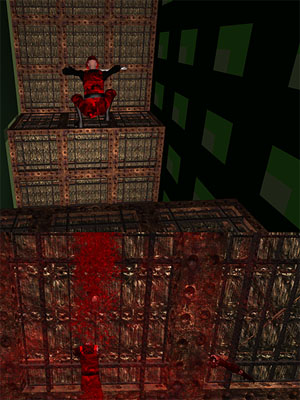
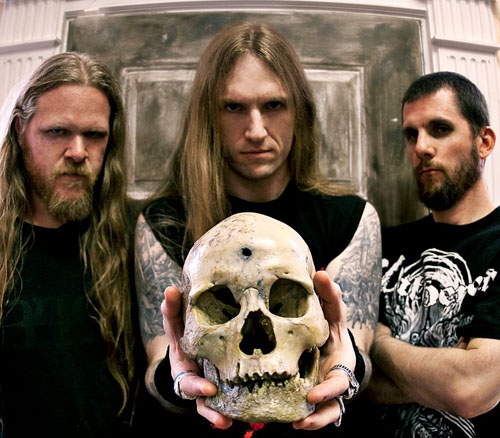
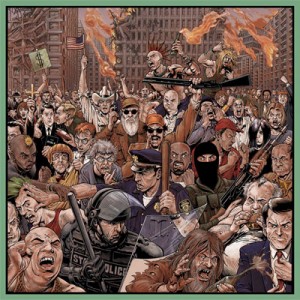 Back in the 1980s thrasher music — a hybrid of punk and metal listened to by skateboarders — was big. In the 2000s,
Back in the 1980s thrasher music — a hybrid of punk and metal listened to by skateboarders — was big. In the 2000s, 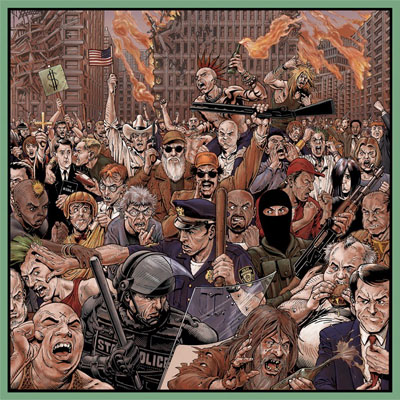
 Averse Sefira is one of a half-handful of north american bands who create something other than three-chord punk disguised as black metal. What drives you to take a mental vision and project it through music, instead of creating a variant on known musical patterns? How did you collaborate on this vision, and what was the course of its evolution?
Averse Sefira is one of a half-handful of north american bands who create something other than three-chord punk disguised as black metal. What drives you to take a mental vision and project it through music, instead of creating a variant on known musical patterns? How did you collaborate on this vision, and what was the course of its evolution? WRATH: So few people are savvy enough to recognize that christianity is a way of thinking, now more than ever. One can still be christianized and never say a prayer, set foot in a church, or even believe in Jehova. It is christian to demand that everyone be treated with the same regard and merit even when it is unwarranted. It is christian to rationalize behavior that stands in flagrant opposition with professed beliefs, the most common example in the underground being anti-christian yet having a christian significant other (most guys take what they can get without question). It is christian to compromise even when it is clear that the ends will not justify the means. Whether or not the Norse bands were truly adherent in their ideals, their music and words stood firmly against this. Too few really read Euronymous’ mission statement and understood its intent. The Norwegian movement was meant to put a stop to the open door policy of the current scene and implement a new variation that was not intended for everyone. Here again we return to the idea of elitism and why it is so necessary. As previously addressed, the traditional underground still holds these values closely for good or ill, as it is often rigorous to do so when glad-handing scensters continue to get in the way. I agree with Nietzsche’s outlook in this regard; it is particularly true in the US where christian sentiments have long subverted more sensible and functional means and values. Things here no longer run smoothly, as “being fair” or worrying about “people’s feelings” undermines common sense when it comes to getting anything accomplished. Conversely, the whole model is illusory in that so few who enforce these conventions truly believe in them. They assume the person next to them does, however, and thus they adopt a position that will ensure the least amount of judgment or sanctions. This, in its most rudimentary sense, is Christianity — servility for the promise of a nebulous reward.
WRATH: So few people are savvy enough to recognize that christianity is a way of thinking, now more than ever. One can still be christianized and never say a prayer, set foot in a church, or even believe in Jehova. It is christian to demand that everyone be treated with the same regard and merit even when it is unwarranted. It is christian to rationalize behavior that stands in flagrant opposition with professed beliefs, the most common example in the underground being anti-christian yet having a christian significant other (most guys take what they can get without question). It is christian to compromise even when it is clear that the ends will not justify the means. Whether or not the Norse bands were truly adherent in their ideals, their music and words stood firmly against this. Too few really read Euronymous’ mission statement and understood its intent. The Norwegian movement was meant to put a stop to the open door policy of the current scene and implement a new variation that was not intended for everyone. Here again we return to the idea of elitism and why it is so necessary. As previously addressed, the traditional underground still holds these values closely for good or ill, as it is often rigorous to do so when glad-handing scensters continue to get in the way. I agree with Nietzsche’s outlook in this regard; it is particularly true in the US where christian sentiments have long subverted more sensible and functional means and values. Things here no longer run smoothly, as “being fair” or worrying about “people’s feelings” undermines common sense when it comes to getting anything accomplished. Conversely, the whole model is illusory in that so few who enforce these conventions truly believe in them. They assume the person next to them does, however, and thus they adopt a position that will ensure the least amount of judgment or sanctions. This, in its most rudimentary sense, is Christianity — servility for the promise of a nebulous reward.
 Some have said the Christian vision of the “soul” is nothing more than the ego yearning to assert itself despite mortality. Do you think this is true? The ego is also paradoxical, in that it is both useful and, if too much of it occurs, destructive. Is there a general principle that can be derived from this?
Some have said the Christian vision of the “soul” is nothing more than the ego yearning to assert itself despite mortality. Do you think this is true? The ego is also paradoxical, in that it is both useful and, if too much of it occurs, destructive. Is there a general principle that can be derived from this? Do you believe in the soul?
Do you believe in the soul?

